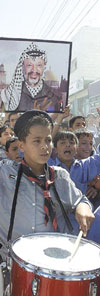
Bush, Arafat exchange harsh words (Al Bawaba)
WASHINGTON (FinalCall.com) – On the 10th anniversary of the handshake on the White House lawn that promised that Arabs and Jews were on their way to sharing the Middle East Holy Land in peaceful coexistence, the government of Israel is warning that it will “remove” Palestinian Authority President Yasser Arafat.
The result, warn diplomats around the world, including at least two former high-ranking Israeli officials, could be chaos, “major bloodshed,” or even the dissolution of the Jewish state.
Yet, in the face of bitter world condemnation–even from the United States–and daily protest rallies by thousands of Mr. Arafat’s Palestinian supporters, the second ranking official in the Israeli government reiterated his country’s threat Sept. 14, that killing Mr. Arafat is an option open to Israeli military forces, along with expelling him or keeping him under siege.
“(Mr.) Arafat can no longer be a factor in what happens here,” Vice Prime Minister Ehud Olmert said, according to several published reports. “Expulsion is certainly one of the options; killing is also one of the options,” he said, describing the duly elected president of the Palestinian Authority as one of the “heads of terror.”
Palestinian legislator Saeb Erekat condemned Mr. Olmert’s statements as “the behavior and actions of a mafia and not a government,” according to The Chicago Sun-Times. Mr. Erekat was a member of the 1991 negotiating team that met secretly with Israeli officials in Madrid working out details of the Oslo accords, which were announced with a handshake between Mr. Arafat and Israeli Prime Minister Yitzhak Rabin at the White House Sept. 13, 1993.
The world hailed that event as a historic turning point in the Middle East conflict and Messrs. Arafat and Rabin shared the Nobel Peace prize the following year.

Secretary of State Colin Powell rejected Mr. Olmert’s suggestion, warning that it would cause the region to erupt in rage. “The United States does not support either the elimination of him or the exile of Mr. Arafat. … The Israelis know our position quite well,” Mr. Powell told Fox “News Sunday” in a broadcast interview from Baghdad Sept. 14.
“The consequences would not be good ones,” Mr. Powell continued. “I think you can anticipate that there would be rage throughout the Arab world, the Muslim world and in many parts of the world.”
UN Secretary-General Kofi Annan agreed, warning that it would be “unwise” to take action against Mr. Arafat. The chief UN envoy to the Middle East declared that the peace process has broken down and said he fears even worse bloodletting lies ahead.
Palestinian UN Ambassador Nasser al-Kidwa said the Security Council should take an immediate stand “when illegal actions are taken by member states.”
The European Commission, the executive arm of the European Union, said Mr. Arafat’s removal would be a “terrible mistake,” and promised that the EU would continue to maintain contacts with “the democratically elected president of the Palestinian Authority.”
Reaction throughout the Arab and Muslim world was predictably swift and strong. Palestinian militants warned all Israelis of a “volcano of anger” if the threat is carried out. “Touching Yasser Arafat and his aides would see the unstoppable volcano of Palestinian anger erupt,” said al-Aqsa Martyrs Brigade, an armed faction of Mr. Arafat’s al Fatah organization.
“We tell the criminal (Israeli Prime Minister Ariel) Sharon: Your people will pay dearly because a wave of martyrs will blow up everyone living in Israel,” according to the group’s statement published by the Tehrantimes.com.
Mr. Arafat’s expulsion will have “disastrous consequences across the region and further afield,” Arab League spokesman Hisham Yussef said in Cairo according to Arabnews.com. “It would herald the death of all efforts to bring about peace.”
“The decision constitutes a dangerous Israeli escalation of the regional situation and a violation of international law and UN resolutions,” an official Saudi Arabian spokesman said.
The expulsion or murder of Mr. Arafat would be a “serious error that could put the region on the threshold of an uncertain future,” Jordanian Information Minister Nabil Sharif warned. The action, he continued, “seriously threatens the peace process.”
The unprecedented Israeli decision has even prompted former Israeli officials to speak out. Former foreign minister, Schlomo Ben Ami, warned that expelling Mr. Arafat “would be counter-productive and would lead nowhere.” He told Spanish radio SER: “Israelis are deluding themselves if they think that by changing (Palestinian) leaders they will change the price of peace.”
Another former Israeli official went even further, predicting “the end of Zionism,” in an article in London’s The Guardian newspaper. “Israel must shed its illusions and choose between racist oppression and democracy,” Avraham Burg, former Speaker of Israel’s Knesset from 1999-2003 wrote in an article Sept. 15.
“The Israeli nation today rests on a scaffolding of corruption, and on foundations of oppression and injustice. As such, the end of the Zionist enterprise is already on our doorstep.”
Dan Gillerman, Israeli Ambassador to the UN told The Final Call that while he has very high respect for Mr. Burg and for the publication The Guardian, he nevertheless disagrees with the article. Mr. Burg is “quite mistaken.” Mr. Arafat’s removal “will bring about a quick conclusion to the problem.”
At the UN, the Security Council debated a draft resolution at Final Call press time, which would reaffirm at least seven Security Council decisions still in effect, dating back to 1967 and which would reiterate its “grave concern at the tragic and violent events that have taken place since September 2000,” the start of the Palestinian “Intifada.”
The draft resolution, offered by the Arab League, also called for an expression of the Security Council’s grave concern about “the recent dangerous deterioration of the situation, including the escalation in extrajudicial executions and suicide bombings,” and demands that Israel, “the occupying Power, desist from any act of deportation and to cease any threat to the safety of the elected President of the Palestinian Authority.”
The draft resolution also calls for increased efforts to ensure the implementation of the “Road Map,” authored by the United States, Russia, the United Nations and the European Union.
The Israeli government, however, declared Mr. Arafat to be “a complete obstacle” to peace, and vowed that the country still retains the option to “work to remove this obstacle in the manner, at the time, and in the ways that will be decided upon separately.”
“Recent days have proven again that Mr. Arafat is determined to prevent any process of genuine reconciliation between Israelis and Palestinians,” Ambassador Gillerman said during the Security Council debate. “I dare say, there is hardly a diplomat in this room who would not admit privately that Mr. Arafat represents a significant obstacle to this process.”
The Israeli ambassador then called Mr. Arafat a “terrorist entrepreneur” who is “at the helm of those who have been supporting mega-terror attacks, in the style of the bombing of the Twin Towers, sending the region to the brink of catastrophe.”
Palestinian ambassador Dr. Nasser al Kidwa walked out during the Israeli representative’s speech. He later told reporters that the “Jewish statement was pure trash,” in linking the World Trade Center tragedy to Mr. Arafat. He termed that effort an attempt to draw the emotions of the American people into the debate.
“In simple terms, this was a very racist statement,” Dr. al Kidwa said.
John Negroponte, U.S. Ambassador to the UN, told reporters that he was not ready to say what action this country would take on the resolution, but he said there must be “robust condemnation of terrorism.”
Mr. Negroponte added that there was no useful purpose for any new resolution in the Security Council. He said that the way to go was for The Quartet of nations sponsoring the Road Map to meet at the end of September in New York City to talk about how best to start the process again on the Road Map to peace.












